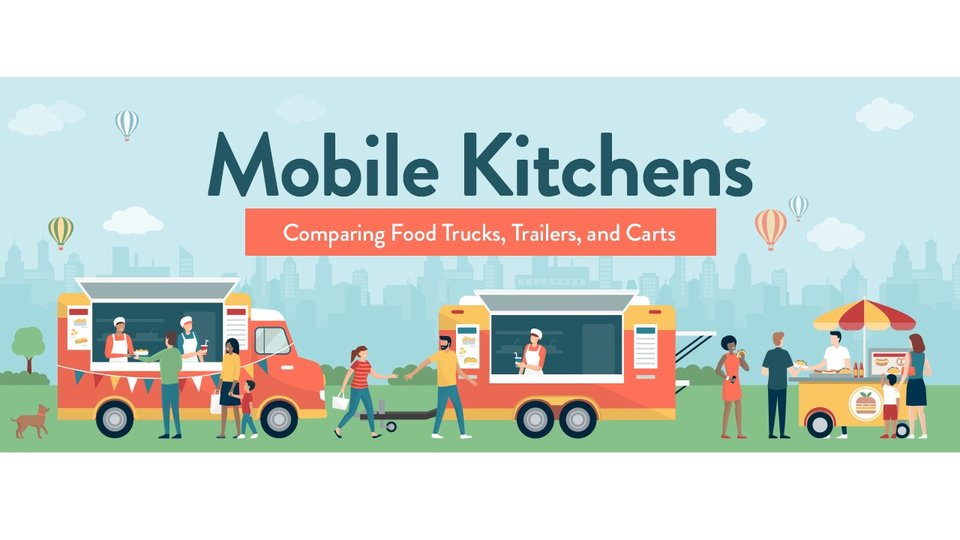Commentary
Want to join the rising mobile food business? What to consider
Mobile kitchens are the fastest growing segment of the foodservice industry. Entrepreneurs interested in joining this business must first decide which type of mobile food business best fits their capabilities: a food truck, a food trailer or a food cart.

November 11, 2020 by Richard Traylor — Writer, WebstaurantStore
The food truck industry is the fastest growing sector of the overall foodservice industry; it's no secret that food trucks are taking the nation by storm. Their popularity has grown so rapidly that several cities are known for their food truck scene. With the food truck market estimated to reach $996 million by the end of 2020, any foodservice professional may be interested in joining this thriving industry.
Before you do, however, you may want to ask yourself if a food truck is right for you or if there is a better mobile food business model that would better suit your business. We set out to compare food trucks, food trailers and food carts to help you determine which type of vehicle would be best for your mobile kitchen endeavors.
 |
Mobile food businesses come in various styles and sizes to serve a variety of purposes. It is important to consider their differentiating characteristics before choosing your primary food transport vehicle.
These are the main characteristics to review when deciding between a food truck, a food trailer or a food cart.
1. Mobile kitchen size
The size of your mobile kitchen will determine where you can park and what types of events you can attend.
- Food trailer — The largest in size, ranging from 8-53 feet long and 7-8 1/2 feet wide.
- Food truck — Ranges from 10-26 feet long and 7 feet wide.
- Food cart — Smallest in size, ranging 4-7 feet long and 2-6 feet wide.
2. Kitchen space and storage capacity
The size of your interior kitchen space can have an impact on what you can bring with you and your staff size.
- Food trailer — Large enough for full-sized restaurant equipment, cleaning supplies and full cooking staff.
- Food truck — Reduced size may call for more dependence on countertop cooking equipment, space-saving storage solutions and a staff of 1-3 cooks.
- Food cart — Limited space may call for very few small appliances and warmers and a staff of 1-2 employees.
3. Mobile kitchen price
Start to shape your budget by knowing what a mobile kitchen may cost you before you invest.
- Food trailer — ~$30,000-$50,000.
- Food truck — ~$50,000 - $250,000.
- Food cart — ~$5,000 - $20,000.
4. Vehicle mobility
The way a mobile kitchen navigates can help determine which events and locations they best cater to.
- Food trailer — Needs to be towed from place to place and may be too large for certain locations based on available parking space.
- Food truck — The kitchen is inside the vehicle and can be driven from place to place.
- Food cart — Needs to be pushed by hand, attached to a bicycle, or towed from the main kitchen to the serving location.
5. Mobile kitchen location and event type
The type of locations and events a mobile kitchen is designed for can help you choose the right one for your business model.
- Food trailer — Large events, seasonal fairs, weddings and concert venues.
- Food truck — City streets, fairs and carnivals, block parties and parks.
- Food cart — City sidewalks, amusement parks and boardwalks.
6. Mobile kitchen menu capabilities
The size of your mobile kitchen can directly impact your menu selections.
- Food trailer — Can have a full multi-course menu.
- Food truck — The menu must be narrowed to a few items that follow a similar theme or cuisine type.
- Food cart — Limited to one or two specialty items and some snacks.
7. Purpose
Choose a mobile kitchen that best helps you reach your target demographic.
- Food trailer — Long-term parking, multi-day events.
- Food truck — Stop-and-go location hopping.
- Food cart — Relies on foot traffic within walking distance from the location.
The vehicle type you choose can ultimately impact your entire mobile kitchen business plan, so it is important to consider these factors early in the process. Ultimately, the best vehicle for your brand will come down to your goals and budget.
Part two of this two part series will explore the pros and cons of food trucks, food trailers and food carts.
Images courtesy of Webstaurant Store.
About Richard Traylor
Richard Traylor graduated from Temple University in the winter of 2014 with a degree in Strategic Communications. After graduating, he taught English in South Korea for two years, during which he was fortunate enough to travel and see the world. In October 2016, he returned home and started to work in SEO Content at Webstaurant Store. This blog previously ran on Webstaurant Store.
 ChatGPT
ChatGPT Grok
Grok Perplexity
Perplexity Claude
Claude






